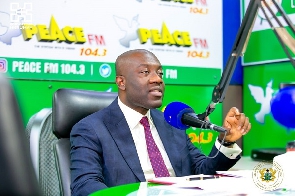 Minister for Information, Kojo Oppong-Nkrumah
Minister for Information, Kojo Oppong-Nkrumah
The Minister for Information, Kojo Oppong-Nkrumah, has defended the decision of the government to introduce three new revenue measures (taxes).
According to him, the taxes were needed to increase Ghana’s tax-to-GDP ratio, which is woefully inadequate compared to that of other countries in the West African sub-region and the world.
Speaking in an interview on Kumasi-based Oyerepa TV monitored by GhanaWeb on Monday, April 3, 2023, the minister also clarified that despite the new names of the revenue measures, they are just an expansion of existing tax laws.
“These (the taxes) are existing laws that we are implementing to get more money for the government for the development of the country. These taxes have been expanded to include people who were previously not.
“The tax-to-GDP ratio of Ghana is 13 percent and so we saw the need to expand some of these taxes. What we have done will ensure that we get a tax-to-GDP ratio between 16 and 18 per cent so that we can get closer to the 20 per cent target.
“We have not increased the taxes; we have only included people and items who were not included in these taxes. If you take the Fiscal Responsibility Act which has now become the Growth and Sustainability Act, we have added mining companies and other who were previously not covered by the law," he said.
The information minister added that the new Exercise Duty Levy has included some goods that were not previously covered by the previous law and the Income Tax Law has been amended to ensure that wealthy people pay more taxes.
Parliament passed three new tax measures on Friday, March 31, 2023, during an extended sitting of the House.
The said taxes also faced stiff opposition from the Minority Caucus in the House, but the Majority managed to marshal all their numbers on the day to get the taxes passed.
The three new taxes are: Excise Duty Amendment Bill 2022, the Growth and Sustainability Levy Bill 2022, and the Income Tax Amendment Bill 2022.
The bills were presented to Parliament as part of the government's plans to mobilize about GH¢4 billion in domestic revenue annually.
They are also crucial to helping secure board approval for the US$3 billion International Monetary Fund (IMF) program after a staff-level agreement was reached late last year.
Watch the interview below in the video below:
Watch the latest edition of People & Places below:
IB/OGB